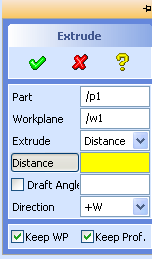And... Action! (31 Aug 2009)
print and
CoCreate Modeling commands such as extrude differ and how they
interact, you've come to the right place.
Usually, I call a dialog like this: (set_pers_context "Toolbox-Context" function) Or like this: function As soon as I add parentheses, however, the "ok action" will be called: (function)
 When highway45 talks of "functions" here, he actually means commands like
When highway45 talks of "functions" here, he actually means commands like extrude or turn. So, (set_pers_context "Toolbox-Context" extrude)? Really? Wow!
set_pers_context is an internal CoCreate Modeling function dealing with
how UI elements for a given command are displayed and where. I was floored -
first, by the fact that an end user found a need to call an internal function like this,
and second, because that magic incantation indeed works "as advertised" by highway45.
For example, try entering the following in CoCreate Modeling's user input line:
(set_pers_context "Toolbox-Context" extrude)Lo and behold, this will indeed open the
Extrude dialog, and CoCreate Modeling
now prompts for more input, such as extrusion distances or angles.
What's so surprising about this, you ask? If you've used CoCreate Modeling for a while,
then you'll know that, as a rule of thumb, code enclosed in parentheses won't prompt
for more input, but will instead expect additional parameters in the command line itself.
For example, if you run (extrude) (with parentheses!) from the user input line, Lisp will
complain that the parameter "DISTANCE is not specified". But in highway45's example, there
clearly was a closing parenthesis after extrude, and yet the Extrude command started to
prompt!
So is set_pers_context some kind of magic potion? Try this:
(print extrude)The Extrude dialog opens and prompts for input! Seems like even
print has
magic powers, even though it's a plain ol' Common Lisp standard function!
Well, maybe there is something special about all built-in functions? Let's test this out and
try a trivial function of our own:
(defun foobar() 42) (foobar extrude)Once more, the dialog opens and awaits user input! So maybe it is neither of
set_pers_context, print or foobar that is magic - but instead extrude.
We'll tumble down that rabbit hole next time.
To be continued...
to top
Edit | Attach image or document | Printable version | Raw text | Refresh | More topic actions
Revisions: | r1.4 | > | r1.3 | > | r1.2 | Total page history | Backlinks
Revisions: | r1.4 | > | r1.3 | > | r1.2 | Total page history | Backlinks
 Blog
Blog